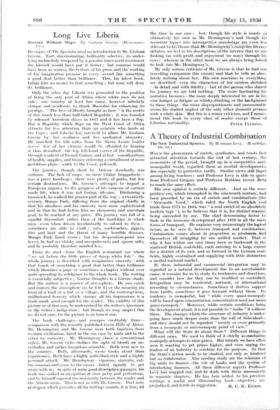Long Live Liberia
REALIMS of The Spectator need no introduction to Mr. Graham Greene. Tart, discriminating, brilliantly selective, its under- lying Melancholy tempered by a genuine inner acrid merriment (he himself would haVe put it better ; but commas would have been as scarce), the texture of his prose and the working of his' imagination promise . in every second line something. a goOd deal better than brilliance. This, his latest book, brings him no nearer to that something ; but none will deny
its brilliance. •
Only the other day Liberia was promoted to the position of being the only part Of 'Africa where 'white men do not rule ; one country at least has cause, however infinitely oblique and academic, to thank Mussolini for enhancing its prestige. " The love of liberty brought us here " is the motto of this much less than half-baked Republic ; it was founded by released American slaves in 1847 and it has been a flop. But a Republic which flops on the West Coast of Africa attracts far less attention than an aviatrix who lands at the Cape ; and Liberia has survived to allure Mr. Graham Greene by her seediness and her uncharted obscurity. He marched for 350 miles from the Sierra Leone border across--few of her citizens would be offended by hearing it thus described--the top left-hand corner of the Republic, through a salient of French Guinea, and at last—considerations of health, supplies, and finance enforcing a curtailment of more ambitious plans--south to the Coast, pell-mell.
The journey, though short by African standards, was arduous. The lack of maps—no mere titular braggadocio— was a grave handicap ; there were plenty of paths, but few certain destinations. Mr. Green's attempts to impart a European urgency to the progress of his caravan of carriers made life, when it was not boring, irksome. Disdaining a hanuiiock, he walked the greater part of the way : a twentieth- century Mungo Park, differing from the original chiefly in that his aloofness and his curiosity were more sophisticated and in that he had before hint no glamorous and uncertain goal, to be reached at any price. his journey was full of a squalid discomfort rather than of the hardships in which. men—even when driven involuntarily to submit to them— sometimes are able to exult : rats, cockroaches, jiggers, dirt and heat and the threat of many horrible diseases. Muni) Park fared worse ; but his desperation-point was lowet he had no whisky and mosquito-nets and epsom
and he probably therefore minded less.
Front its start—from the English restaurant car where "we sat before the little pieces of damp white fish"—the whole. journey is described with imaginative sincerity—with that -touch of something a good deal better than brilliance which illumines a page or sometimes a chapter without ever quite-spreading its refulgence to the whole book. The writing is essentially subjective ; Greene thoughts in a Greene shade. But the author is a master of atmosphere. He can catch and convey the atmosphere (as he felt it) or the meaning (to him)'of a trail or a but or a village, and the contemptuous, unillusioned honesty which stamps all his- impressions is a trade-mark good enough for the reader. The validity of this picture or of that may be undermined by the writer's ignorance or Hie writer's indigestion ; but though we may suspect this we do not care, for the picture is an honest one.
The book challenges—and emerges creditably from— comparison with the recently published Green hills of Africa. Mr. Hemingway and Mr. Greene were both fugitives front western civilisation, lured in the one case by kudu and in the other by curiosity. Mr. Hemingway chose a conventional safari, Mr. Greene (who dislikes the sight of blood) an un- orthodox and rather hazardous scramble. Both were new to the • country. Both, afterwards, wrote books about their experiences. Both have a highly individual style and a highly' personal attack. Mr. Hemingway—vigorous, staccato, cut- the-commas-and-come-to-the-cusses—failed signally to get away -with it, ;... imsgite staine,gotAde:actiptive4ittsgages; hitt book was soaked in an egotism at once petty and portentous, and he himself capered too insistently between the reader and the African scene. This is not so with Mr. Greene. That note of disgust which pervades all his writings sounds, it is true, all
the time in our ears ; but, though his style is nearly as obtrusively his own as Mr. Hemingway's and though his recurrent lapses into introspective anecdotage are even less
relevant tfilit Mi.. HeiiiingivaSiri camp=ftie lititary debates, we feel in his descriptions of the interior that weare looking (as with profit and enjoyment we may) through his eyes ; whereas in the other book we are always being forced to look into Mr. Hemingway's..
My only serious criticism of Mr. Greene is that he had one travelling companion (his cousin) and that he tells es abso- lutely nothing about her. His own reactions to everything are described—even the characters of hig carriers sketched —in detail and with fidelity ; but of the.person who shared his journey we are told nothing. The more fascinating narrative. becomes—the more deeply interested we are in hi; own hunger or fatigue or whisky-drinking or the hackgrotmd to these things—the more disproportionate and unreasonable seems his studied neglect of the only other dramatis perSona with a white skin. But this-is a minor criticism, and reeorn- mend this book to every • class of reader except those of






















































 Previous page
Previous page